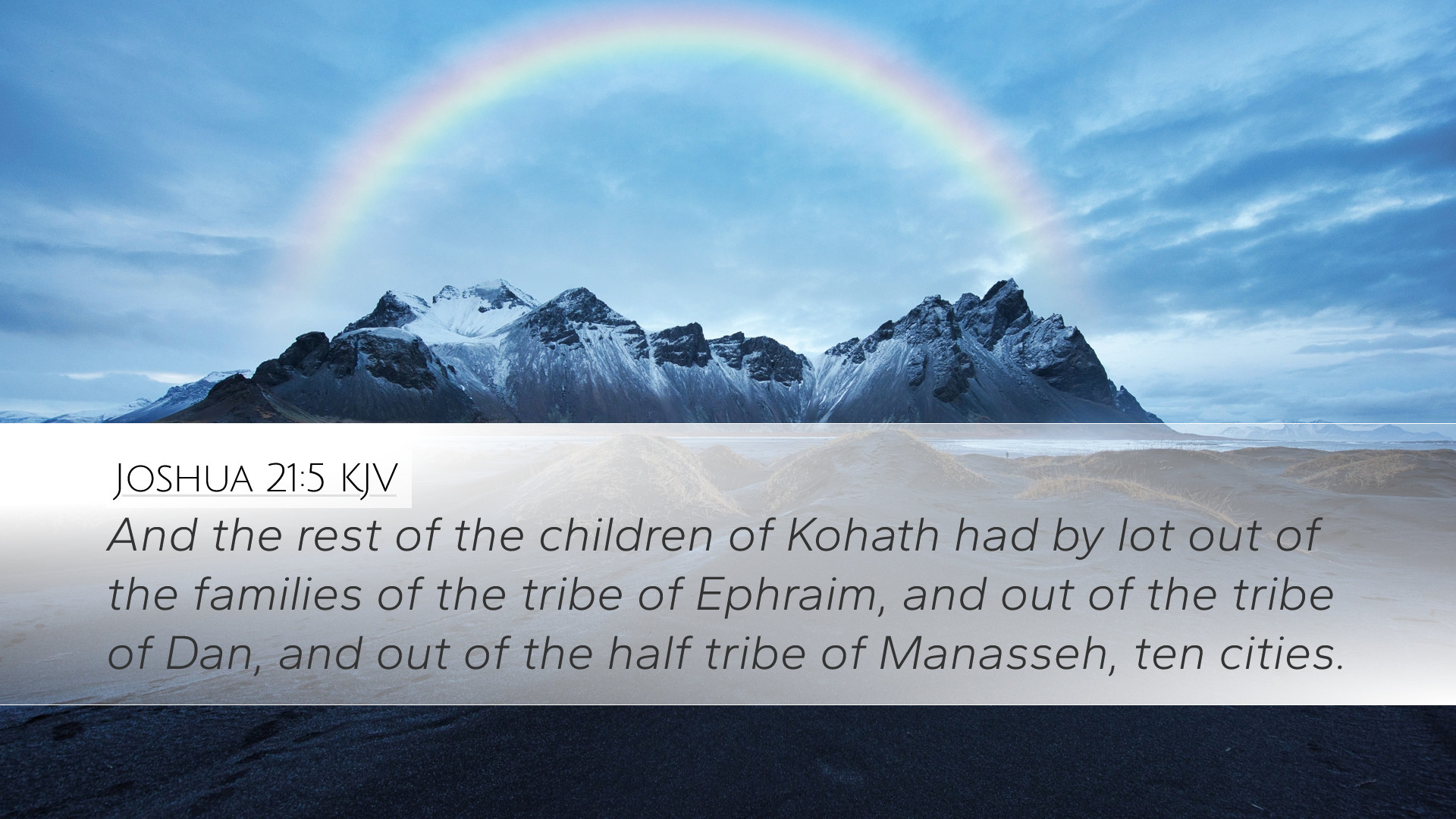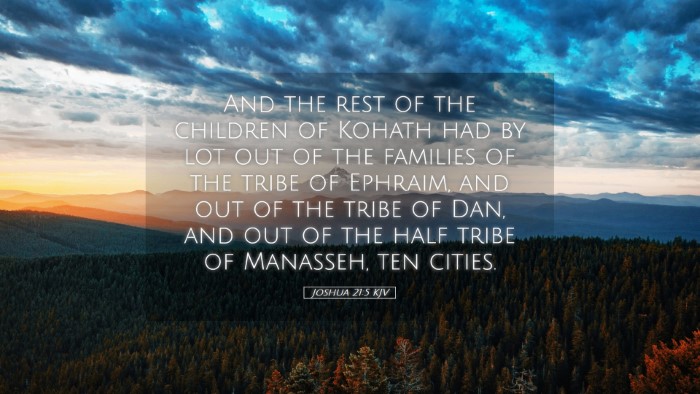Commentary on Joshua 21:5
Verse: Joshua 21:5 - "And the rest of the children of Kohath had cities of their coasts out of the tribe of Ephraim."
Introduction
This verse references the specific allotment of cities to the Levite tribe of Kohath, detailing God's provision for His servants and the importance of the priestly tribe within Israel. Understanding this passage requires delving into the culture, duties, and significance of the Levites in biblical narrative.
Contextual Background
Historical Context: The Book of Joshua describes the conquest and division of the Promised Land among the twelve tribes of Israel. Chapter 21 specifically addresses the allocation of cities to the Levites, who were set apart for religious service. The Levites did not receive a territorial inheritance like the other tribes; instead, they were given cities to dwell in, emphasizing their role as ministers and teachers of God's law.
Commentary Insights
Matthew Henry's Commentary
Matthew Henry emphasizes the divine order in the distribution of cities to the Levites. He notes that even within the inherited lands of the tribes, the Levites were to receive a place of their own, demonstrating God's intention to provide for those who serve Him. It reflects the principle that the ministers of God are to be supported by the congregation, ensuring that they can focus on their spiritual duties without distraction.
Albert Barnes' Commentary
Albert Barnes highlights the significance of Kohath in the context of the Levite clans. He mentions that Kohathites were instrumental in the transportation of the holy items of the tabernacle. The cities allocated to them, particularly in Ephraim, signify the strategic positioning of worship and teaching centers throughout Israel. This allocation reflects a divine plan to maintain remembrance of the Lord and proper worship among His people.
Adam Clarke's Commentary
Adam Clarke expounds upon the importance of the cities given to the Levites as a means for them to carry out their priestly functions. He points out that these cities, although not tribal lands in the conventional sense, were essential for maintaining the religious life of Israel. Clarke also discusses the geographical significance of the cities in Ephraim and their role in providing access to worship and instruction in God's law.
Theological Reflections
Divine Provision: The allocation of cities to the Levites illustrates God's commitment to providing for the needs of those dedicated to His service. This aspect is critical for understanding how God operates in covenant relationship. The responsibilities of the Levites serve not only practical needs but also a theological function where they represent the people before God.
- Support for Ministry: This arrangement underscores the necessity of community support for pastoral work. Modern application emphasizes that congregations should ensure their church leaders are adequately provided for.
- Accessibility of Worship: By distributing the Levite cities throughout Israel, God ensured that all tribes had access to religious education and sacrificial practices. This is relevant for today’s understanding of church planting and ensuring spiritual leadership is accessible to all members.
- Preserving Holiness: The placement of holy cities was intended to maintain a heritage of worship and instruction, which serves as a model for contemporary church efforts to sustain community holiness.
Lessons for Pastoral Ministry
- Role of Pastors: Pastors, much like the Levites, are tasked with guiding the community towards God. Their provision, both materially and spiritually, reflects a church's commitment to God's work.
- Community Engagement: The Levite cities served to engage surrounding communities, prompting questions of how modern churches can create outreach opportunities.
- Faithfulness in Service: The dedication of the Levites can inspire current leaders to serve faithfully, recognizing their role as facilitators of God’s presence among the people.
Conclusion
Joshua 21:5 serves as a rich resource for understanding the integration of divine provision and spiritual leadership in Israel. The careful delineation of the Levite cities highlights God's foresight in establishing mechanisms for worship and community life. For pastors, students, and theologians today, this verse reinforces the importance of supporting ministry and ensuring access to spiritual oversight in congregational life.


